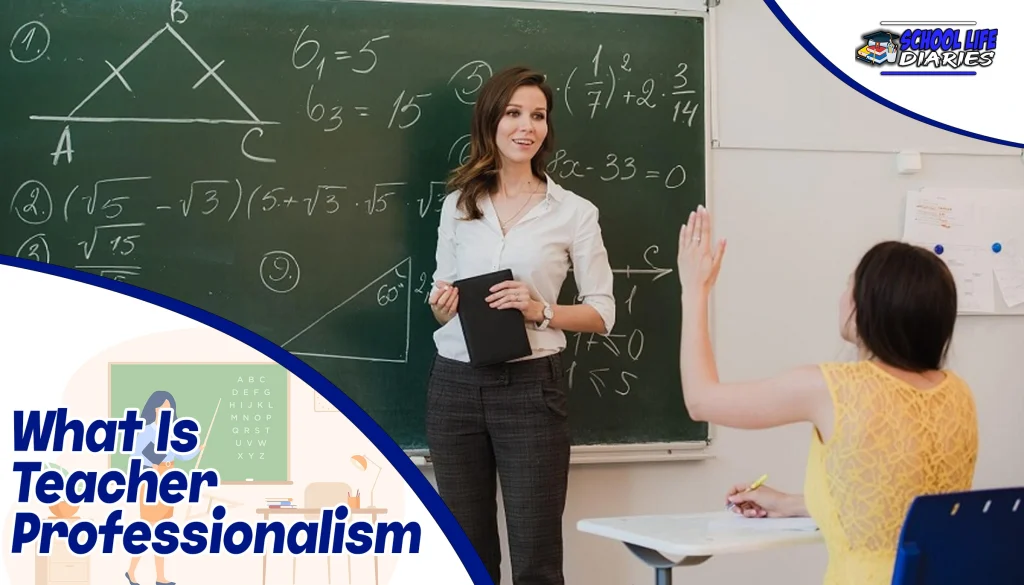Teacher professionalism is a crucial aspect of the education system that has both positive and negative impacts. It refers to the level of competence, dedication, and ethical behavior exhibited by teachers in their profession. Teacher professionalism can have numerous benefits for all stakeholders involved in education, but there may also be some negative impacts associated with it. This article will delve into these aspects by examining various perspectives on the topic.
Why teacher professionalism is important?
The significance of teacher professionalism lies in its ability to foster a culture of excellence within educational institutions, thereby enhancing overall teaching quality and student learning outcomes. When teachers adhere to professional standards and conduct themselves with integrity, it creates an environment that prioritizes the benefits of teacher professionalism in student learning.
Teachers who demonstrate professionalism are more likely to be knowledgeable about effective instructional strategies and have a deep understanding of their subject matter. This expertise translates into improved teaching practices, which ultimately leads to better academic achievements for students. Its benefits extend beyond individual classrooms, influencing school culture, teacher-student relationships, parent engagement, and career advancement opportunities.
How to develop professionalism in teaching: Write at least 5 tips
To cultivate professionalism in teaching, educators can employ various strategies that foster a sense of dedication, expertise, and integrity within their practice. One crucial strategy is the importance of mentorship in teaching. By pairing experienced teachers with novice educators, mentorship programs provide guidance and support to new teachers, helping them develop their skills and build confidence in their abilities. Implementing technology in the classroom is an essential step toward fostering professionalism in teaching. In today’s digital age, integrating technology tools not only enhances student engagement but also equips educators with new ways to deliver content effectively.
Teachers can use online platforms for assignments and assessments or leverage multimedia resources to cater to diverse learning styles. Embracing technology demonstrates adaptability and a commitment to staying current with advancements in education. Promoting a positive learning environment is crucial for cultivating professionalism among educators. A supportive atmosphere encourages mutual respect between students and teachers while fostering a love for learning.
Positive impacts of Teacher Professionalism:
Enhancing professionalism in teaching has the potential to foster a culture of growth, collaboration, and excellence within the educational community. When teachers embody professionalism, it creates a positive impact on various aspects of education.
Teacher professionalism encourages professional growth and development among educators. Professionals strive for continuous improvement by engaging in reflective practices such as self-assessment and seeking feedback from colleagues or mentors. This commitment to ongoing professional development not only enhances their own teaching abilities but also inspires other educators within the community to pursue similar growth opportunities.
Cultivating teacher professionalism brings numerous benefits such as improved teacher-student relationships, enhanced learning outcomes for students, opportunities for professional growth among educators themselves as well as fostering collaborative teaching approaches within schools or educational institutions. It is essential for educators to continuously reflect on their practices, seek feedback from colleagues and students, and adapt to new teaching methods and technologies.
Negative impacts of TEACHER PROFESSIONALISM:
One potential consequence of teacher professionalism is the potential for increased stress and burnout among educators. When teachers are expected to uphold high standards of professionalism, they may feel pressured to constantly meet these expectations, which can lead to excessive workload and emotional exhaustion. The challenges faced by teachers in maintaining professionalism can contribute to feelings of overwhelm and burnout, negatively impacting their mental health and overall job satisfaction.
Another negative aspect that arises from an overemphasis on teacher professionalism is its potential impact on teacher-student relationships. While it is important for teachers to maintain boundaries with their students, an excessive focus on professionalism may create a sense of distance between educators and learners. Building positive relationships with students requires a level of warmth, empathy, and understanding that may be compromised when teachers feel constrained by rigid professional expectations
Professional development tips for educators: Write at least 5 tips
Professional development for educators can be enhanced through the following strategies:
- Time management is crucial for educators to make the most of their professional development opportunities. Teachers should prioritize their tasks and allocate specific time slots for learning and growth. This can involve setting aside dedicated hours each week or attending workshops and conferences during school breaks.
- Collaboration strategies play a significant role in enhancing professional development for educators. Teachers should actively seek out opportunities to collaborate with their colleagues within and outside of their schools. Collaborating with others allows educators to share ideas, learn from different perspectives, and gain new insights into teaching practices.
- Effective communication is essential when it comes to professional development for educators. Educators need to articulate their goals and aspirations clearly to ensure that they are able to find relevant resources and support systems. They should also actively seek feedback from mentors or peers as this helps them reflect on their progress and areas for improvement.
- Utilizing technology has become increasingly important in modern-day professional development for educators. Teachers should explore various digital tools and platforms that offer resources such as online courses or webinars related to education topics they are interested in exploring further.
- Reflective practice is an essential component of professional development for educators. Teachers should regularly reflect on their teaching practices, classroom management techniques, and student outcomes. This reflection can be done through journaling, self-assessment, or seeking feedback from colleagues and students.
How can teachers balance their personal beliefs with the need for neutrality in the classroom?
It is essential for educators to recognize that while they have their own personal beliefs and values, they are responsible for creating a safe space where students feel comfortable expressing their opinions without fear of judgment or bias. This requires teachers to be aware of their own biases and actively work towards providing an unbiased learning experience.
Navigating personal beliefs in the classroom can be challenging but necessary for teachers. One approach is to separate personal beliefs from professional responsibilities by focusing on the curriculum and providing multiple perspectives on controversial topics. Managing personal values as a teacher involves self-reflection and continuous professional development.
It is important to remember that neutrality does not mean suppressing one’s convictions, but rather finding ways to present information objectively while also acknowledging differing viewpoints. Striking a balance between personal beliefs and professionalism requires open-mindedness, empathy, and respect for others’ perspectives.
What are some resources available for teachers to enhance their professionalism?
Various resources exist to support educators in enhancing their professionalism, including professional development workshops, online courses, mentoring programs, and educational conferences. Online courses have become increasingly popular in recent years, offering teachers the flexibility to engage in professional learning at their own pace and convenience.
Professional conferences serve as another valuable resource for teachers seeking to enhance their professionalism. These events bring together educators from various backgrounds and offer opportunities for networking, sharing best practices, and staying up-to-date with the latest research in education. Teacher mentorship programs are yet another resource available for educators looking to enhance their professionalism.
Educational journals also play a crucial role in supporting teacher professionalism by providing a platform for scholarly articles on various educational topics. Teachers can access these journals both in print form and online platforms dedicated to publishing academic research related to education. By reading articles published in these journals regularly, educators stay informed about current trends and research findings that inform best practices in teaching.
Conclusion:
In conclusion, teacher professionalism plays a crucial role in the field of education. It is important for teachers to develop and maintain professionalism in order to create a positive learning environment, establish strong relationships with students, and enhance their own professional growth. Teacher professionalism has several positive impacts including increased student achievement, improved classroom management, enhanced teacher-student relationships, and higher levels of job satisfaction.
To continue developing professionally throughout their careers, educators can engage in activities such as attending workshops or conferences related to their subject area or teaching methods. They can also join professional organizations or participate in online communities where they can collaborate with other educators and gain new insights.
In summary, teacher professionalism is vital for creating a positive impact on both students’ learning outcomes and the overall education system. By continuously striving for excellence through personal growth and development opportunities offered within the profession itself, teachers have the ability to positively shape future generations by providing quality education that meets the needs of all learners whilst balancing this against their personal beliefs.











